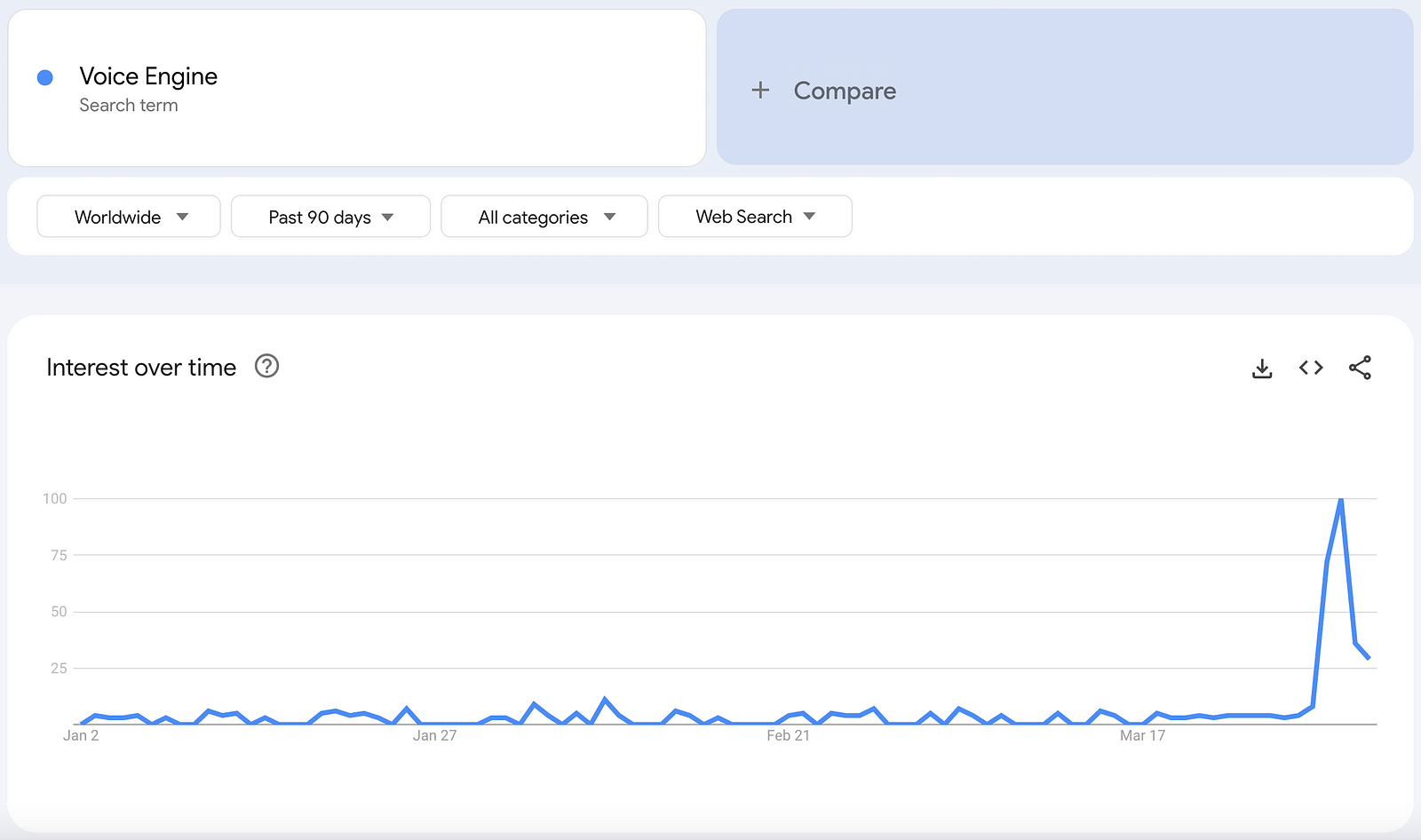- Solan Sync
- Posts
- Open AI did it again: The Business Potential of OpenAI’s Voice Engine for Personalized Learning
Open AI did it again: The Business Potential of OpenAI’s Voice Engine for Personalized Learning
Unveil the transformative business potential of OpenAI’s Voice Engine in education. Learn how personalized synthetic voices can revolutionize learning experiences, with insights into ethical and security considerations.

OpenAI’s introduction of the Voice Engine model is a significant step forward in the realm of artificial intelligence and synthetic voice technology.
This development signifies a move towards creating more personalized and accessible digital experiences, particularly in areas like education, healthcare, language translation, and accessibility for non-verbal individuals. However, it also raises important ethical and security considerations that need to be addressed.
Implications of Voice Engine
Watch here:

Advancements in Personalization and Accessibility
Education: Custom voices can provide a more engaging and personalized learning experience for children, potentially improving outcomes in reading and comprehension.
Healthcare Training: Offering training in native languages can enhance understanding and retention for healthcare workers, leading to better patient care.
Accessibility: For non-verbal individuals, having a unique synthetic voice can be empowering and improve communication capabilities.
Ethical and Security Considerations
Voice Impersonation Risks: The ability to clone a voice from a short sample presents significant security challenges, especially in areas relying on voice authentication.
Privacy Concerns: The collection and use of voice samples to create synthetic voices must be carefully managed to protect individual privacy.
Why It Matters
The development of realistic synthetic voices can greatly benefit various sectors by providing more personalized and accessible services.
However, the potential for misuse and the implications for security and privacy highlight the need for robust ethical guidelines and security measures, such as the watermarking mentioned by OpenAI, to ensure that the benefits of such technology can be realized without compromising individual rights or safety.
As the technology progresses, it will be crucial for society, regulatory bodies, and technology developers to collaborate in addressing these challenges. Ensuring that synthetic voice technology is used responsibly and ethically will be key to harnessing its potential for positive impact.
OpenAI’s Approach
OpenAI’s cautious approach to releasing the Voice Engine model, including its decision to test with select partners and implement safeguards, reflects an awareness of these challenges. This cautiousness is important in balancing innovation with ethical considerations and security risks.
Comparing the Market
While OpenAI is not alone in this space, its ability to generate convincing voices from minimal data sets it apart from competitors like Play.ht and ElevenLabs. This efficiency could make voice synthesis technology more accessible and versatile, but it also underscores the importance of addressing the ethical and security implications associated with such powerful tools.
Based on the innovative capabilities of OpenAI’s Voice Engine, a compelling business idea emerges in the domain of Personalized Educational Content Creation. This venture would leverage the Voice Engine to create customized educational materials, where lessons are delivered in voices that students find engaging or comforting, such as a beloved character, a celebrity, or even their own voice. This concept could be particularly impactful in language learning, special education, and motivation in educational settings.
Business Idea: Custom Voice Educational Platform
Overview A digital platform offering personalized educational content, utilizing synthetic voices to make learning more engaging for students. Users can choose from a range of voices for their lessons or upload a sample to create a custom voice.
Advantages
Increased Engagement: Custom voices can make learning materials more relatable and engaging for students, potentially improving attention and retention rates.
Accessibility: Offers a unique opportunity for non-verbal learners or those with learning disabilities to interact with content that speaks in a voice they choose, making learning more accessible.
Language Learning: Enhances language learning experiences by providing pronunciation in a variety of accents, making the learning process more authentic and diverse.
Emotional Connection: Helps in creating an emotional connection to the learning material, especially for young learners who might feel more engaged when lessons are delivered in a familiar voice.
Disadvantages
Ethical Concerns: The use of real individuals’ voices, even if synthesized, could raise privacy and consent issues that need to be navigated carefully.
Quality Assurance: Ensuring the synthetic voice maintains a high quality and doesn’t distract from the learning due to unnatural intonations or pacing.
Security Measures: Protecting the voice data of users, especially when custom voices are created, to prevent misuse.
3-Month MVP Action Plan
Prototype Development: Create a basic version of the platform capable of integrating with OpenAI’s Voice Engine to generate and deliver lessons in synthesized voices.
Content Partnership: Collaborate with educational content providers to secure a diverse range of learning materials for the platform.
Pilot Testing: Launch a pilot program with a select group of learners from different educational levels to gather feedback on user experience and engagement.
Refine and Iterate: Use feedback from the pilot to refine the user interface, expand the voice options, and improve content delivery.
Launch Marketing Campaign: Develop a targeted marketing campaign focusing on the unique value proposition of personalized learning experiences to attract early adopters.
Points for Validation
Market Demand: Conduct surveys and market research to validate the demand for personalized voice in educational content.
User Feedback: Collect and analyze user feedback on engagement levels and learning outcomes with personalized voices versus standard narration.
Ethical and Legal Considerations: Consult with legal experts to navigate the ethical and legal aspects of using synthesized voices, particularly concerning consent and privacy.
Technical Feasibility: Evaluate the technical feasibility and scalability of integrating Voice Engine technology with the educational content on the platform.
Thank you for reading this article so far, you can also access the FREE Top 100 AI Tools List and the AI-Powered Business Ideas Guides on my FREE newsletter.
What Will You Get?
Access to AI-Powered Business Ideas.
Access our News Letters to get help along your journey.
Access to our Upcoming Premium Tools for free.
If you find this helpful, please consider buying me a cup of coffee.
📚 Try Awesome AI Tools & Prompts with the Best Deals
🧰 Find the Best AI Content Creation jobs
⭐️ ChatGPT materials
💡 Bonus
🪄 Notion AI — Boost your productivity with an AI Copilot
Notion AI is a new feature of Notion that helps you write and create content using artificial intelligence. Notion offers a number of AI features.
Here are some of the best features:
Write with AI: This category includes a feature called “Continue writing”. This feature is useful if you don’t know exactly how to continue writing.
Generate from page: In this category, you will find, for example, functions for summarizing or translating texts.
Edit or review page: The features of this category help you to improve your writing. Examples: Fix spelling and grammar, change tone, or simplify your language.
Insert AI blocks: You can also insert AI blocks. AI blocks are predefined instructions that you can execute later. These blocks are useful for Notion templates.

Reply